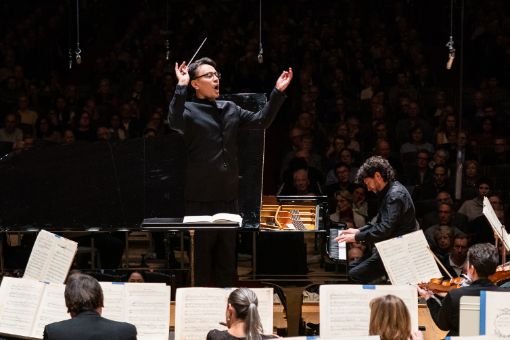Berlioz, Ravel, and Estevez: A Makeshift South American BSO Concert

Photo Courtesy of Robert Torres
Every time I go to Symphony Hall, I marvel at its beauty. Home to the Boston Symphony Orchestra since it was built in 1900, some rank it acoustically as the finest concert hall in the United States. Sitting on the side mezzanine of the audience, I noticed Beethoven’s name is inscribed above the stage. With some research, I learned that Beethoven was the only musician’s name that the directors could agree on. The concert hall seats 2,625 people, and on the night of April 13th, it was almost full.
I was excited for this concert, for it embraced not only the “traditional” european classical music, but also classical music from other cultures. The program, containing works of Berlioz, Ravel, and Estevez, was a celebration of all classical music. Due to lingering injuries, Dudamel unfortunately had to withdraw from the second week of concerts. The original program of Latin American composers was abandoned, and only Estevez remained. However, the conductors and soloists Ken-David Masur, James Burton, Sergio Tiempo, Aquiles Machado, and Gustavo Castillo also represented a diverse range of backgrounds and perspectives.
The concert opened up with a beautiful english horn solo in Berlioz’s Roman Carnival Overture. Masur was energetic and enthusiastic in his conducting and was a great piece to start the program. Ravel’s Piano Concerto in G major was delicately played by Tiempo. Beginning with an effortless glissando, I knew I was in for a good performance. Sitting on the left mezzanine, I had perfect view of Tiempo’s hands. The challenging passages of the second movement didn’t faze Tiempo as his left hand maintained a rhythm that his right hand flowed over it with the melody. His mastery of piano was evident in the way he evoked emotion and feeling into every note. As an encore, Tiempo performed one of the dances from his Three Argentinian Dances, paying homage to his home country.
The last piece of the night was the impressive Cantata Criolla performed by the Tanglewood Festival Chorus. Describing the story of a singing contest between a Venezuelan cowboy and the devil, Machado and Castillo were entertaining and captivating singers. Backed by the talented chorus, it was a real treat for all of us listening below. I really appreciate the Boston Symphony Orchestra’s noticeable recent attempt to incorporate the music of many cultures and identities and hope they will only continue to embrace diversity.
Amy Zhou is a Classical Producer for WHRB. Tune in to WHRB for classical music anytime Monday through Friday from 1 to 10pm, Saturday from 1 to 9pm, and Sunday from 2pm to midnight.